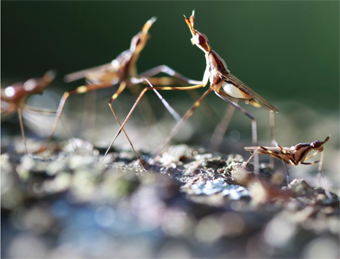What if the quality of your parents’ diet could have an effect on your lifespan? Parental age has been shown to affect offspring fitness in surprising ways. Generally speaking, offspring produced by older parents do not live as long and little is known as to why this occurs. One proposed mechanism is non-genetic inheritance (i.e., inheritance of traits not produced through genetic coding). Once rejected by the modern synthesis, non-genetic inheritance has enjoyed a renaissance with many empirical studies showing a variety of underlying mechanisms that operate alongside Mendelian inheritance.
 The Neriid fly (Telostylinus angusticollis). Male mate-guarding female from oncoming male competitors. Photo: Russell Bonduriansky.
The Neriid fly (Telostylinus angusticollis). Male mate-guarding female from oncoming male competitors. Photo: Russell Bonduriansky.
Though many studies have documented the effect of parental age on offspring lifespan, few have examined the detectability of such an effect and its interaction with grand-parental condition to as far as the grand-offspring generation. We carried out a large-scale experimental study to examine the effects of grandparental age and diet on the lifespan in the neriid fly, Telostylinus angusticollis (Diptera: Neriidae). Quality of the parental larval diet for this species has been shown to affect condition and associated traits such as body size and shape, but our study was the first to test for an interaction between parental larval diet and age at breeding, and to test for effects on grand- offspring.
Our findings suggest that grand-offspring lifespan is reduced when either the grandparents or parents bred at older ages, but we also found that the effect of grand-parental age is especially pronounced when their offspring bred at a young age. In other words, lifespan reduction can be transmitted across multiple generations and results in some sort of phenotypic defect that is expressed in an age-dependent manner. The matriline data also suggest that grand- offspring body size is affected by an interaction between grandparental diet and age. This interaction suggests that the inheritance of body size is shaped by multiple factors, and perhaps signifies an influence of age on the nature of correlations among particular traits.
Together our results strongly suggest that reproducing at an older age can have effects that induce phenotypic costs in important life history traits such as lifespan for both offspring and grand-offspring. A reduced lifespan can reduce fitness through fewer opportunities to mate and a decrease in body size can result in less fecund females and poor male competitors. Importantly, the interaction of parental and grandparental age at breeding on offspring lifespan appears to signify a cumulative effect of age at breeding over at least two generations. Further studies are needed to better understand the relative importance of these parental effects and how they combine to shape phenotypic variance and impact fitness in offspring.
Our results suggest that heredity is not as straight forward as we might think. Parental effects on progeny lifespan may persist through multiple generations, a finding that may have implications for the evolution of life-history strategies and ageing. Although the mechanisms that drive these patterns are unknown, this study has revealed some interesting evolutionary phenomena that need further exploration.
Contributed by Zac Wylde, PhD candidate at UNSW.